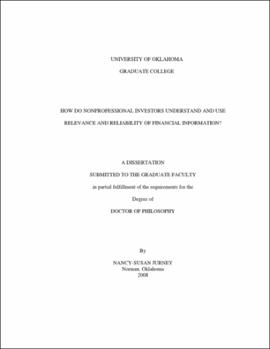| dc.contributor.advisor | Lipe, Marlys G | |
| dc.creator | Jurney, Nancy-Susan | |
| dc.date.accessioned | 2019-06-03T20:35:50Z | |
| dc.date.available | 2019-06-03T20:35:50Z | |
| dc.date.issued | 2008 | |
| dc.identifier | 99361395702042 | |
| dc.identifier.uri | https://hdl.handle.net/11244/320222 | |
| dc.description.abstract | With recent and ongoing changes to the conceptual framework, it is important to gain an understanding of how users of financial information understand and use the relevance and reliability of financial information in their judgments and decisions in an investing context. An important subset of financial statement users is nonprofessional investors. While nonprofessional investors will not be impacted directly by changes to the conceptual framework, they will be affected indirectly by these changes. If standard setters make trade-offs between relevance and reliability in setting new standards, the resulting information provided to users will reflect varying degrees of relevance and reliability due to these trade-offs. Therefore, I examine how investors use such information in their judgments and decisions. The goal of this study is explore how nonprofessional investors think about relevance and reliability, and then examine how they are affected by variations in relevance and reliability of financial information in making investment-related decisions. | |
| dc.description.abstract | This study first explores how nonprofessional investors perceive relevance and reliability and the attributes that they ascribe to these characteristics. Then I test the effects of relevance and reliability of financial information on nonprofessional investors' judgments of the attractiveness of a stock, the amount to invest in the stock, and the effect of the information on the price of the stock. I do this experimentally with MBA students. | |
| dc.description.abstract | The results are consistent with some of the hypotheses. Overall, relevance of financial information is more important to nonprofessional investors' judgments and decisions, indicating that highly relevant information is more likely to affect judgments regardless of the reliability of the information. In addition, results suggest that nonprofessional investors have poor self-insight regarding the importance that they place on relevance and reliability with respect to investment-related judgments and decisions. | |
| dc.format.extent | 104 pages | |
| dc.format.medium | application.pdf | |
| dc.language | en_US | |
| dc.relation.requires | Adobe Acrobat Reader | |
| dc.subject | Individual investors--Psychology | |
| dc.subject | Investments--Decision making | |
| dc.subject | Financial statements | |
| dc.title | How do nonprofessional investors understand and use relevance and reliability of financial information? | |
| dc.type | text | |
| dc.type | document | |
| dc.thesis.degree | Ph.D. | |
| ou.group | Michael F. Price College of Business | |
